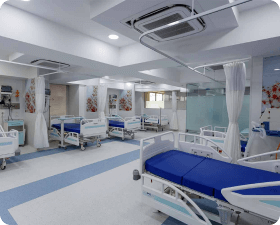Internal Medicine & Critical Care Medicine
Internal Medicine
 Internal Medicine is a medical specialty that focuses on the prevention, diagnosis, and treatment of a wide range of adult diseases. The scope includes managing complex and chronic conditions, as well as providing comprehensive healthcare for adult patients. The services covered under Internal Medicine include:
Internal Medicine is a medical specialty that focuses on the prevention, diagnosis, and treatment of a wide range of adult diseases. The scope includes managing complex and chronic conditions, as well as providing comprehensive healthcare for adult patients. The services covered under Internal Medicine include:
- Preventive Care:
- Health screenings (e.g., hypertension, diabetes, cholesterol)
- Vaccinations and immunizations
- Lifestyle and dietary counseling for disease prevention
- Risk factor assessment for cardiovascular diseases
- Diagnosis and Treatment of Common Adult Diseases:
- Hypertension, hyperlipidemia, and cardiovascular diseases
- Diabetes mellitus and related complications
- Respiratory diseases, including asthma and chronic obstructive pulmonary disease (COPD)
- Gastrointestinal disorders such as ulcers, gastritis, and liver disease
- Kidney diseases, including chronic kidney disease (CKD)
- Endocrine disorders (thyroid, adrenal, etc.)
- Infections such as pneumonia, urinary tract infections, and skin infections
- Chronic Disease Management:
- Diabetes mellitus
- Heart disease (coronary artery disease, heart failure)
- Chronic respiratory conditions
- Osteoporosis
- Arthritis and other rheumatologic conditions
- Coordination of Specialist Care:
- Referral to subspecialists for more specific diagnoses and treatments
- Follow-up and long-term care planning in collaboration with other healthcare providers
- Geriatric Medicine:
- Comprehensive care for elderly patients, addressing complex comorbidities
- Management of age-related conditions, including cognitive decline, frailty, and polypharmacy
Critical Care Medicine
Critical Care Medicine focuses on the management of life-threatening conditions requiring intensive monitoring and treatment. It is an interdisciplinary field that provides immediate, high-level care for patients with severe, acute health conditions. The services provided under Critical Care Medicine include:
- Intensive Monitoring and Life Support:
- Continuous hemodynamic monitoring (heart rate, blood pressure, oxygen levels)
- Mechanical ventilation and respiratory support for patients with severe lung conditions
- Advanced cardiovascular life support (ACLS) for cardiac arrest or life-threatening arrhythmias
- Use of vasopressors, inotropes, and other critical medications
- Management of Critical Conditions:
- Acute respiratory distress syndrome (ARDS) and respiratory failure
- Sepsis and septic shock
- Multi-organ failure, including kidney, liver, and heart failure
- Traumatic injuries requiring intensive care
- Post-operative management of high-risk surgical patients
- Advanced Procedures and Interventions:
- Central venous catheterization
- Arterial line insertion for continuous blood pressure monitoring
- Endotracheal intubation for airway management
- Dialysis for acute kidney failure
- Bronchoscopy for diagnosis and management of airway issues
- Infection Control and Sepsis Management:
- Early identification and treatment of sepsis
- Administration of broad-spectrum antibiotics
- Fluid resuscitation and hemodynamic support
- Multidisciplinary Care:
- Collaboration with cardiologists, pulmonologists, nephrologists, and surgeons for complex patient care
- Coordination of care with nurses, respiratory therapists, pharmacists, and nutritionists
- Regular family consultations to update on patient progress and decision-making
- Post-Critical Care and Recovery:
- Gradual weaning from mechanical ventilation and other life support systems
- Rehabilitation planning for recovery from critical illness
- Management of long-term complications following critical illness
This scope of services ensures comprehensive and multidisciplinary care for patients requiring either general medical treatment or specialized intensive care.
Other Speciality
Procedures
Allergy and immunology
Cardiology
Endocrinology
Haematology
Infectious diseases
Gastroenterology
Nephrology
Oncology
Pulmonology
Rheumatology
Our Team
Meet our team of renowned medical professionals at AB Plus multi-speciality hospital.

Dr. Mahendra Narwaria
A Very Renowned Bariatric, Gi, And Robotic Surgeon

Dr Shilpa Narwaria
Telemedicine And Bariatric Consultant
The Best Telemedicine And Bariatric Consultants In Our Hospital
Telemedicine And Bariatric Consultant

Dr. Sudhendu R. Patel
M.D. (Medicine) - Sr. Consultant Physician

Dr. Parth Patel
MBBS, MD, FNB Critical Care Medicine
The Youngest Gold Medalist Expert Who Can Help You With Your Most Critical Operations
MBBS, MD, FNB Critical Care Medicine

Dr. R.B. Patel
M.S ,F.I.C.S ,F.I.C.A – Sr. Consultant Surgeon

Dr. Hardik Vyas
MBBS , MS – Sr. Consultant Surgeon

Dr. Hardik Padhiyar
MS (ORTHO)

Dr. Priyanka Sharma
Plastic And Aesthetic Surgeon

Dr. Prathan Amin
Orthopaedic Spine Surgeon

Dr. Jignesh Ashwinbhai Gandhi
Expert in Robotic & Advanced Laparoscopic Surgery
Success Stories
We are trusted for our expertise and chosen for our care because we prioritise our patients where empathy and recovery meet.
FAQs
Internal medicine physicians primarily care for people and specialise in disease prevention, diagnosis, and management. In contrast, general practitioners are similar to family practitioners in that they can treat patients of any gender or age.
Their education includes not only adult patients but also surgeries, obstetrics, and paediatrics. They are the first responders for medical emergencies. The majority of internists work for medical groups or public hospital systems. see their patients in the office.
Internal medicine has a lot to offer. Most importantly, it is a specialisation that allows for a great deal of freedom. If you desire to work as a hospitalist, caring for hospitalised patients, you can do so immediately after finishing your IM residency. It is also typical to provide primary care in an outpatient clinic.




